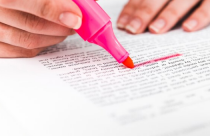An Insight into Manuscript Editing Processes: An Interview With Dr. Candace Pettus (Part 1)

 In this interview, we have a discussion with Dr. Candace Pettus, an editor at Enago. Dr. Pettus has a versatile background, with a major in Biochemistry from the University of California, San Diego, and an MBA from the University of Auckland. In 2003, she completed her PhD from the Department of Management and Employment School of Business and Economics, University of Auckland. She has a vast experience in editing papers from varying fields such business management and information technology. She has also worked with the Auckland government as a Research Manager, as well as with other private sector organizations in different capacities. Dr. Pettus is also affiliated with the Association for Women in the Sciences and the New Zealand Women’s Maritime Association.
In this interview, we have a discussion with Dr. Candace Pettus, an editor at Enago. Dr. Pettus has a versatile background, with a major in Biochemistry from the University of California, San Diego, and an MBA from the University of Auckland. In 2003, she completed her PhD from the Department of Management and Employment School of Business and Economics, University of Auckland. She has a vast experience in editing papers from varying fields such business management and information technology. She has also worked with the Auckland government as a Research Manager, as well as with other private sector organizations in different capacities. Dr. Pettus is also affiliated with the Association for Women in the Sciences and the New Zealand Women’s Maritime Association.
In the first part of the interview, Dr. Pettus shares some thoughts on her experiences as a manuscript editor and how it helps her stay updated on the latest developments in her areas of interest. She also shares some relevant points for giving feedback especially to ESL authors, which often helps them improve the quality of the manuscripts prior to submission.
Hi Dr. Pettus, thank you for taking time out to talk to us today. Given your experience, we wanted to know what exactly has been your approach towards editing and whether you follow certain checkpoints while editing?
I take a very holistic view towards editing, and when I usually review large word documents, I just skim through them to get an idea of what the author is trying to say. In terms of checkpoints, I pay attention to how the authors use things like abbreviations and citations in the document. One of the common issues I find is the lack of consistency. For example, a citation may have been written correctly in the beginning, but after two to three pages the names of the author have been changed to something else. There are other minor issues that I resolve as I move through the document. However, I do try to treat it from a holistic view of what the article is about.
That’s a very interesting approach. What is your strategy towards using remarks in a document for the author? Do you like to make edits in the document without informing the author?
I do not try to assume what the author is trying to say unless I actually see that there is a discrepancy that I can identify that is very apparent. Most of the times when I have a question like that, I go ahead and make the edit and then inform the author to check the revised version. So, instead of enquiring and getting feedback from the author in that sense, I sometimes simply make the change if I can understand the context.
What are the common resources that you generally use while editing? Also, how do you keep yourself abreast of the latest happenings in a specialized area as yours?
The most common resource that I use is Google and there is plenty of information there and most of the time I find what I am looking for quite easily that way. Sometimes, I use the references that are mentioned in the documents, which give me a clue as to what sort of area the authors are working in and some of the specifics there but generally it is Google. These days, and I’ll remind you that I’m quite old, and I’ll hark back now to give you more of an idea about where I’m coming from. I’m what you may call a polymath. So I have degrees in molecular biology, in radiochemistry, an MBA, and a Ph.D. in business economics. Since I have been mostly editing about a million words a year for the last five years, I have had the opportunity to look at research right from the cutting edge in a variety of fields. Given the nature of the clientele I work for, I have a very broad range of things to read from, which helps me overall to remain abreast of the latest research.
When you come across any paper that is not from your core subject area or something that you are not familiar with, do you stick to your approach or do you follow a different approach? Also, do you have any strategy that you follow differently for such odd papers?
This is a good question and surely I have had some interesting types of papers to work with in the last few years. I had one that was on accounting history. Although it might seem really boring to some people, it was a brilliant paper to read and was very new. In the process of looking through the whole paper and checking the references at the back, I got a fair idea of the article, what area this is in and the keywords. I certainly have enough background knowledge to be able to follow a number of different ideas from looking at the text.
How do you curb the desire to rewrite a document, especially if the original language is very bad or if the subject matter is very familiar to you? In such cases, do you tend to add more remarks or do you actually intervene and let the author decide?
I would say a little bit of both because it depends on how bad it is. I don’t try too hard on the first pass. So when I’m making the first pass through the document I will look at technical issues, consistency, and general grammar. I use the highlight key quite a bit to maintain my flow through the document, making little highlights to myself to indicate that I need to come back to this again because sometimes the answer is further along the document. Most of the times, the interpretation can be found out by reading the text. For instance, you may have an abstract that might be quite difficult and you are not really sure what it is about, but by the time you reach the Discussion, it usually becomes clear what the authors are trying to say. We get a lot of colloquialisms and it is important to maintain a certain academic tone. That said, it totally depends on the context of the document because some of the things may be purely marketing information or advertising. So you just have to follow the style that would be most suitable for the purpose of the document.
(This interview is a part of our interview series of connecting scholarly publishing experts and researchers.)








